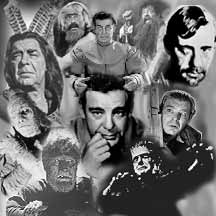
LON CHANEY JNR
"Living under a Shadow"

If ever a man had a reputation to live up to it was Lon Chaney Jnr.
Born Creighton Chaney in 1906 , he worked under the shadow of his famous father Lon Chaney (1800-1931) for all of his working life. Creighton Resisted using the name Lon Chaney Jnr for as long as he could, but finally succumbing under protest to the name change due to pressure from the industry and the need to work.


Creighton made his own niche in the movie industry with two characters that will always be his. He was "The WOLFMAN" and the other part that Creighton was to become most famous for was "LENNY" from the 1939 picture "Of Mice and Men". This was probably Creightons greatest acting role. Again due to type casting he was to repeat the Lenny role many times in various movies and Television shows, good, bad and indifferent.
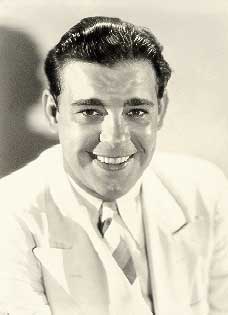
Lon Chaney Jnr died in 1973 due to Liver failure, many stories have followed his death about his battle with the drink, but Lon always gave 100% in all his roles. The movies during the later part of his career may not have been classics but they were always watchable just to see Lon at work.
Biography
American character actor whose career was influenced (and often overshadowed) by that of his father, silent film star Lon Chaney. The younger Chaney was born while his parents were on a theatrical tour, and he joined them onstage for the first time at age of six months. However, as a young man, even during the time of his father's growing fame Creighton Chaney worked menial jobs to support himself without calling upon his fathe. He was at various times a plumber, a meatcutter's apprentice, a metal worker and a farm worker. Always, however, there was the desire to follow in his father's footsteps. He studied makeup at his father's side, learning many of his techniques that had made his father famous. And he took stage roles in stock companies.
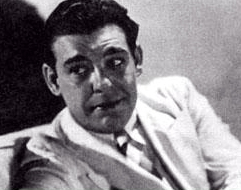
It was not until, after his father's death in 1930 that Chaney went to work in films. his first appearances were under his real name (he had been named for his mother, singer Cleva Creighton). He played a number of supporting parts before a producer in 1935 insisted on changing his name to Lon Chaney Jnr, as a marketing ploy.
Chaney was uncomfortable with the ploy and always hated the "Jnr" addendum. But was also aware that the famous name could help his career, and so he kept it. Most of the parts he played were unmemorable, often bits, until 1939 when he was given the role of the simple minded Lennie in the film adaptation of John Steinbeck's "Of Mice and Men".
Chaney's performance was spectacurlary touching, indeed, it became one of two roles for which he would always be best remembered. The other came within the next year, when Universal, in hopes of reviving their Horror film franchise as well as memories of their great silent star, Chaney Snr, cast Chaney Jnr as the tortured Lawrence Talbot in The Wolfman 1941.
With this film and the slew of Horror films that followed it, Chaney achieved a kind of stardom, though he was never able to achieve his goal of surpassing his father. By the 1950's, he was established as a star in low budget horror films and as a reliable character actor in more prestigious, big budget films such as High noon 1952.
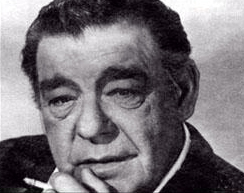
Never as versatile as his father, he fell more and more into cheap and mundane productions which traded primarily on his name and those of other fading horror stars. His later years were bedeviled by illness and problems with alcohol. When he died from a variety of causes in 1973, it was as an actor who had spent his life chasing the fame of his father, but who was much beloved be a generation of filmgoers who had never seen his father.
Mini Biography by Jim Beaver
Lon Chaney is the only person to have played all four of the Classic Monsters.
Wolfman 1941
Frankenstein's Monster in The Ghost of Frankenstein 1942
Kharis the Mummy in 3 Mummy films
Dracula in Son of Dracula 1943
![]()
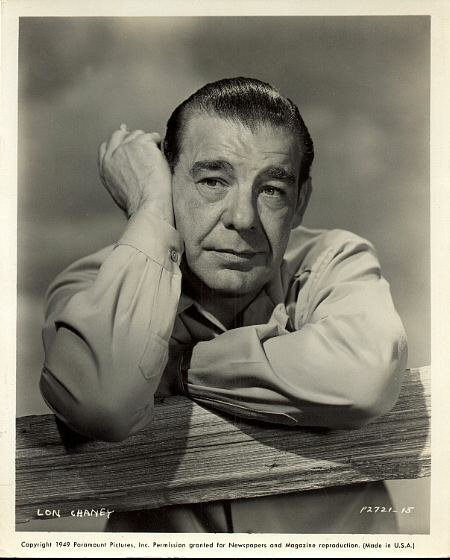
Kim Newman biography from BFI Companion to Horror. 1996
Lon Chaney Jnr (1906 - 1973)
American Actor, son of Lon Chaney. It is a truth universally acknowledged in the world of the creative arts that the shadows of famous fathers lie heavy on their children. None was so smothered by parental celebrity than Creighton, who assumed his father's name for reasons of profession if not pride. Hulkingly brutish (six foot, two inches), he had little of his father's grace and became a low-grade feature player in Universal's cheapo horrors. He proved himself a useful character actor outside the genre, notably the retarded Lenny in John Steinbeck's Of Mice and Men (1939), but was considered a star for those programmers desirous of cashing in on a name which meant so much in terms of thrills and appalled audiences.
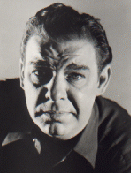
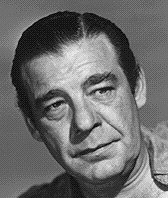
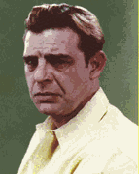
Though Chaney Senior forbade his son access to the acting profession, young Chaney took up work as an extra and stuntman after his father's death. Cut from The Most Dangerous game (1932), he made his horror debut in an aquatic atrocity, the serial Undersea Kingdom (1936). He is a caveman of unpleasant hairiness in One Million B.C. (1940), a forecast of the way he was typecast by Universal Studios for The Wolfman (1941).
"I think I must have played that character more than any other actor", he said with a tinge of melancholy. He also played the Frankenstein Monster, Dracula's son and the Mummy, in descending order of merit. Of all his deplorable B movies, the best suited to his talent for a haunted-eye pathos, imprisoned within a huge frame, is Man Made Monster (1941), in which mad scientist Lionel Atwill converts Chaney into a man invulnerable to electricity but able to shock people to death with his touch. In the way King Kong and Karloff, he manages to give a pitiable dignity to a creature who has no choice about the way his life has been created and directed. This melancholic sense of a fated existence, over which the Chaney creature has no control, became more and more evident in the roles accepted, from Abbott and Costello Meet Frankenstein (1947) via La Casa del Terror (Face of the Screaming Werewolf 1959), to the Haunted Palace (1963).
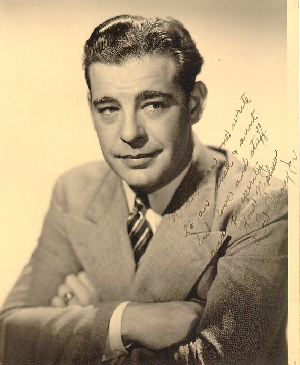
Among later credits, only Spider Baby (1964) has much merit, with Chaney as the chauffeur to a monstrously sick family. He even croons the title-song; in terms of what he had filmed, he did not have much to sing about. His on screen pathos was matched by a tragic private life in which alcoholism took hold and his body bloated to display the effects of the addiction. His last genre film was Dracula vs Frankenstein (1970), in itself a shrewd comment on what had happened to Chaney Jnr. The success of the father was not passed on to the following generation, trying to live up to his parent's reputation was something that, in the long term, brought him low. As a Wolfman he always seemed to be the underdog. Instead of frightening audiences they came to regard him with the kind of affection you bestow upon a well loved pet. In Man of a Thousand Faces (1955), he is played by Roger Smith.